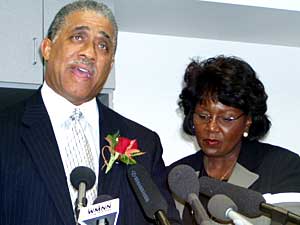|
Audio
Photos
Your Voice
|
Finney announces retirement as St. Paul police chief
November 6, 2003
 |
| Chief William Finney announced his retirement Thursday. To the right is his wife, Linda. (MPR Photo/Brandt Williams) |
St. Paul, Minn. — With his wife Linda at his side, Chief Finney choked back tears a few times as he reflected on his more than three decades with the department.
"Being a cop in this city is probably one of the greatest experiences -- if you're interested in public service, it's probably one of the greatest experiences you can have," he said.
Finney was appointed chief of police by Mayor Jim Scheibel in 1992, making him the first African American police chief in Minnesota history. During his tenure as chief, the department and the city have become more racially and culturally diverse.
 | |||
Finney is credited with hiring officers that more directly reflect the city's changing population. He is also credited with improving relations between police and the community.
"One of the biggest secrets about the city of St. Paul is that people really like their police department. They really like it," Finney said. "There are some communities where people don't like their police. And so if I had something to do to contribute to that, then I figure that's a home run."
Finney was also quick to address speculation that he has political ambitions. Finney was elected to the St. Paul School Board in 1989, but he says politics aren't in his immediate plans. Right now Finney says he's focused on serving out the rest of his term. However, he did say he'll wait and see if he changes his mind once he's finished next July.
Finney has been mentioned as a possible candidate for mayor in 2005. If he runs, he would most likely face current Mayor Randy Kelly, now in his first term.
Kelly and Finney have had a few public disagreements in the past several months. They've clashed over police budget decisions, and the two disagree on the city's decision to build a new police station. Kelly did say Finney has been an asset to the city of St. Paul.
|
One of the biggest secrets about the city of St. Paul is that people really like their police department. ... There are some communities where people don't like their police. And so if I had something to do to contribute to that, then I figure that's a home run.
- St. Paul Police Chief William Finney |
"Police Chief Finney has had the opportunity for the past 33 years to serve our city, serve it well and with distinction, and for the last 12 years -- 11 and a half -- has led this police department with distinction," Kelly said.
Mayor Kelly also lauded Finney's efforts to reach out to communities of color. Perhaps the most prominent example of Finney's work is the anti-racial profiling agreement he helped create two years ago. The police department was called into the federally-mediated talks at the request of the St. Paul NAACP. Four months of negotiations produced what some many call a historic agreement.
The Rev. Devin Miller said that agreement will stand out among other achievements in Finney's career.
"I think he set a standard for policing in metro cities," Miller said.
Miller is a community activist who was involved in some of the discussions that led to the agreement. He says Finney's upbringing in St. Paul, and his ability to connect with various communities of color throughout the city, made him an effective chief.
Miller says police departments around the country, especially those with growing communities of color, should look to Finney and St. Paul as a model.
"Each community across the country is changing like that. Especially with people of color moving into central cities and people of color going into suburban areas. He set a standard for both," Miller said. "To be a police chief you've got to know your community, and you've got to be able to communicate to your community in order to be effective in upholding the law."
City officials say a nationwide search for a new chief could last as long as six months. Finney says he knows of at least 12 officers in the department that are qualified to take over his position.
|
News Headlines
|
Related Subjects
|
